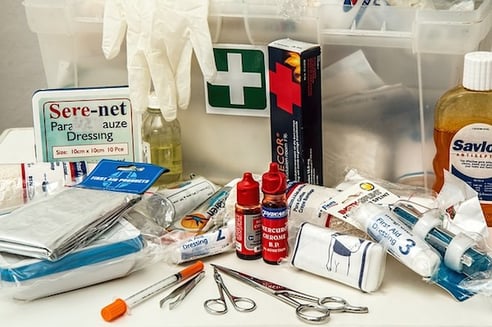What Have You Done Since Your Last Application to Prepare Yourself for a Career in Medicine?
Medicine is one of the most challenging still rewarding fields a student tin can enter. But earlier you determine whether becoming a dr. is correct for y'all, it's important that yous know every step you lot'll accept to take along the way. Here, I'll walk you through exactly how to become a doc, starting with high school. This career is definitely not for everyone—it requires huge investments of time, money, and attempt—but if this path is right for you, this guide is what you should read to start preparing yourself early for a successful career as a doctor. Medicine is a super competitive and rigorous field: doctors have a lot of responsibility and must spend tons of time and money on their preparation. Healthcare is also a growing field, which means that the demand for doctors will go on to increment in the coming years. Equally long as you do all the necessary steps below, yous shouldn't have an upshot finding a chore as a doctor. Permit's take a wait at the career outlook for physicians and surgeons using data from the Agency of Labor Statistics: Note that pay and job outlook can vary depending on what type of doctor you want to be, then if you have a item specialty in heed (such as dermatology or rheumatology), I encourage you to do your own research on that field's projected career outlook. To lend yous a hand, nosotros've created the following chart, which presents the median salaries and task outlooks for diverse types of doctors (arranged in social club of highest salary to everyman): Source: Us Bureau of Labor Statistics Every bit you can see from the chart, all of the in a higher place medical specialties make six figures a year. They do accept some differences in terms of chore growth, all the same. The chore growth rate for psychiatrists is expected to be a well-above-average 14% in the next ten years, but specialties such equally surgeons and pediatricians are expected to shrink slightly. There are a lot of jobs in each of these fields though, so don't call back there won't be a need for them in several years, even if their numbers are expected to contract a bit. Becoming a physician is a pretty complex, multi-step process. Hither are the vii major steps nosotros'll be covering in more particular below (you can skip around by clicking the links to each step): Step one: Do well in high school Still interested in how to get a doctor? Time to get into the nitty-gritty of each major step. If you're serious almost becoming a doctor, you'll do yourself a big favor by getting focused in high school. Every bit mentioned, this is a pretty competitive field, so the before you lot kickoff distinguishing yourself as a peachy educatee, the easier the procedure will be. Here's what you can do in loftier school to help set y'all for later steps. To fulfill all pre-med requirements in higher (I'll get to that in a bit), yous'll have to take quite a few science and math classes. Lay a solid foundation by taking a science and math course every year, and brand it a priority to take advanced and/or AP courses. Yous'll also want to keep your GPA (in these classes and all others) as high as possible. This is an important step because it gives you lot a tiny glimpse into what college and medical school will exist similar. If you don't enjoy science and math courses in high school, it'south unlikely you'll relish them later on. Use this as an opportunity to recollect critically about whether you'd like to pursue this career. Ane of the unmarried nearly important parts of your college application is what classes you choose to take in high schoolhouse (in conjunction with how well you lot exercise in those classes). Our team of PrepScholar admissions experts have compiled their knowledge into this unmarried guide to planning out your high schoolhouse course schedule. Nosotros'll suggest y'all on how to balance your schedule between regular and honors/AP/IB courses, how to choose your extracurriculars, and what classes y'all can't afford not to have. Being a good doctor isn't just nearly being a science and math whiz—information technology's about existence invested in caring for other people. Prove how you intendance most helping others past volunteering consistently in high schoolhouse. It's best if you can practise volunteer work that's at least somewhat related to healthcare. You might see whether there are whatever opportunities at a nearby hospital or clinic (for example, I had friends in high school who helped escort people who were visiting family members in the hospital). These volunteer opportunities can besides aid you determine fairly early on whether a career in medicine is something y'all're actually interested in pursuing. Of course, you don't have to volunteer exclusively in healthcare environments—any community service opportunity in which y'all're helping other people is a practiced fit. Read more about the benefits of community service, and then check out our list of the best places to volunteer. Is working in healthcare a proficient fit for yous? Volunteering in the field is a not bad fashion to find out. To get into a corking medical school, it helps to go to a neat higher. And to get into a great college, it helps to go a high score on the Saturday/ACT. Programme on taking your first examination by the end of your junior twelvemonth—this gives you time to take your test of choice again if you want to try to raise your scores. Read these guides for more info on how to get a not bad Saturday/Deed score: Your senior fall will exist all about researching and applying to colleges. You lot don't necessarily demand to go to a school with a dedicated pre-med programme, but it'll be better if your college or university has potent science and math programs, since these will be more helpful in preparing you for the MCAT and med school. If you want to get to a top-tier private schoolhouse, yous'll accept to submit applications with the post-obit: Some cracking public schools might not require letters of rec or applications essays. Nevertheless, it's wise to start preparing these materials early on in the college application procedure if y'all think you'll apply to whatever colleges that do require them. If yous're still working on college research, I advise checking out these guides: College is where you really showtime focusing your studies and preparing for a career in medicine. Here's everything you should practice equally an undergraduate to prepare yourself for the next major pace in becoming a doctor: medical school. Most medical schools require students to have taken a series of courses as undergraduates. This ensures that they have strong foundational knowledge in math and scientific discipline and volition exist well prepared for the more than advanced courses they'll have to take equally med students. Here are the core classes that about medical schools require: This comes to 12 course requirements at minimum, which doesn't give you a ton of wiggle room if y'all also have to run across requirements for a major without much pre-med overlap (e.g., foreign languages or studio art). Because of this, many pre-med students cull related majors such as biological science or chemistry—this makes it much easier to meet both pre-med requirements and the requirements for your major. If you decide later in college that you'd like to apply to medical school but you know y'all don't have time to fit in all these requirements, don't panic. It'southward fairly common for people to wrap up pre-med requirements by taking an extra semester or two in college (some schools phone call these students "super seniors"). Y'all might also look into full-time post-bac programs if you have more than a few requirements left to fulfill. These options mean extra time and extra expenses, but they're helpful (and sometimes necessary) steps to accept earlier applying to med school. Your transcript will be a very important office of your med school applications, so your academic operation should really exist your #1 priority every bit you piece of work your way through college. Y'all'll demand a few strong letters of recommendation from respected faculty members when you submit your med school applications—use this fact to motivate you to network with as many people as possible. Develop relationships with professors and mentors by going to their part hours, actively participating in class, and taking opportunities to work on research projects. Your nerdy professors will prove to exist invaluable resource when yous're applying to med school, merely only if you lot take relationships with them! Having some research feel under your chugalug is a large plus for med school applications, especially if you can clasp in a publication or two. Working in a biology or chemistry lab would probably exist most helpful for medical schoolhouse. There are a couple means you tin can get enquiry experience every bit an undergraduate: Medical schools are going to await at your community service record as an important part of your application. Y'all should make fourth dimension for volunteer piece of work in college merely equally you lot did in high school. The good news is that information technology should be easier to observe relevant advocacy and community service clubs and organizations in college. Here are a few example activities you might be interested in (although this list is by no means exhaustive): It's meliorate to stick with a few clubs or activities over the long term, as opposed to jumping effectually between activities yr afterward year. This demonstrates that you're consequent and reliable; it as well opens up opportunities for leadership roles, which volition bear witness to be a big plus for your med school applications. The Medical College Access Test, or MCAT, is used as a predictor of your success in med school, and as such is weighted pretty heavily when compared to other parts of your application. Most students take the MCAT their junior yr—this is arguably the most optimal fourth dimension to accept the test. Why? Because by this point you will have gone through many of your pre-med courses, making studying for the MCAT a lot easier. In total, information technology takes 7 and a half hours to complete the MCAT. The sections on the test include the post-obit: Each section is scored on a range from 118 to 132, with a median score of 125. You'll receive an private score for each section in addition to an overall score. Total scores range from 472 to 578, with the boilerplate score sitting at about 500. This scoring system is yet relatively new (since 2015), so there isn't much historical information available nosotros can use to predict what a skilful or "safety" MCAT score volition be for med school admissions. Current percentiles signal that around 50% of examination takers score 500, and 74% score 508, or what MCAT-Prep.com calls a "good" MCAT score. Every bit such, the new MCAT encourages admissions officers to await favorably upon students who score around 500 or above. The MCAT is administered thirty times per twelvemonth, so yous have quite a scrap of flexibility when it comes to scheduling the test. Be prepared for some hefty expenses—it costs $325 to register for the test. There are Fee Assist Programs available for students who might not be able to shoulder these expenses. Later your scores are calculated, they're automatically released to the American Medical College Application Service (AMCAS); you won't take to submit them separately to whatever schools unless they don't use AMCAS. If you lot're adequately prepared the first time you take the MCAT, you could save yourself the cost of an extra registration fee. Plan on studying 200-300 hours if y'all want to do well on the test. Since it's a 7-and-a-half-hour examination, yous really don't desire to accept to accept information technology twice. In that location are several unlike ways you lot tin prep for the MCAT: You can besides buy an official practise exam for the MCAT through the Association of American Medical Colleges for $35, in addition to other official report guides and prep materials. The medical school application procedure is extremely long. If you lot want to start med school the autumn afterward yous graduate from college, y'all'll accept to first your applications your junior year. The boilerplate student applies to almost thirteen schools to optimize their chances of getting in—I wouldn't recommend that you put together a list much smaller than that. The Medical School Admission Requirements (MSAR) website is one of the best tools for looking into of import medical school information. For a $28 year-long subscription, you tin hands access the following: As with any school or program, in that location are med school ranking lists. Because US medical schools' admissions criteria and curricula are and then stringent and rigorous, though, admission to any school in the country should exist considered an accomplishment. If yous stop upwards in medical schoolhouse and follow through with a residency at a good hospital, yous'll have no trouble finding work equally a doc. In that location are two types of physicians in the US: Both types are fully licensed physicians and are often very like in the way that they practice medicine—they merely receive degrees from slightly unlike types of programs. Nosotros're nearly used to hearing about doctors with MDs, then if you're not familiar with DOs, I encourage you to exercise more research on these types of programs. DOs receive boosted specialty training in certain areas, including using the hands to diagnose/treat illnesses and injuries. Yous tin can read more about osteopathic medicine on the American Osteopathic Association site. Allopathic or osteopathic: which blazon of med schoolhouse is correct for you? There are three parts of the med school application process. You send in your primary application by June the year before your first yr of med school. Most med schools use AMCAS, which is like a Common Awarding for med schools. This awarding includes official transcripts, a personal statement, your resume/CV, and your MCAT scores. Start preparing these materials a few months earlier submission. This ordinarily happens in July-Baronial on a typical awarding timeline (i.e., one on which y'all submit the primary application in June). At this indicate, a school will either reject your principal application or ask you to consummate its secondary application. The secondary application will differ for each school you apply to. Sometimes, schools just inquire you lot to submit an application fee to continue with the application process. Other times, though, schools send fairly all-encompassing lists of essay prompts (e.k., "Why are you interested in attending this medical school?") for you to respond. If the medical school is happy with your primary and secondary applications, you'll move on to the next office. If a school definitely does (or definitely does not) want to interview you, you'll hear back from them pretty quickly. Some students are left in limbo for a while as schools deliberate over what to do with them. Interviews are the final controlling phase. Your interview will either make or break your application. Preparing for interviews is tough because each school (and each interviewer) will have its own priorities and questions. Overall, you want to come up off (one) committed to the medical track, (2) confident in your abilities, (3) eager to learn, (iv) warm and empathetic, and (5) grateful for the opportunity to exist at that place. After fulfilling all the pre-med requirements and submitting all those applications, you finally get in here: medical school. You'll spend 4 years here, but that doesn't mean the experience will be very like to that of your undergraduate education—at that place are more decisions to be made, more opportunities for hands-on experiences, and more than professional person licensing requirements to worry nigh. Here's an overview of what these four years of med school will look like: There are some other of import steps along the mode, such as board exams, that I'll accost in this section besides. You won't have much say in what courses you'll take during your showtime two years of medical school. Your education during this time will exist an extension of your pre-med requirements—you'll take many advanced courses that will give yous the important biological, anatomical, and chemic foundations you lot'll need to work every bit a physician. These courses will plainly take an important impact on your GPA, which will affect how competitive you are when yous're matched for your residency/internship (we'll get to that shortly). As such, it's of import to go on your grades up—your future cocky will give thanks you! At the end of your second twelvemonth, you'll accept the U.s.a. Medical Licensing Examination, or the USMLE-one. This test assesses your medical competency to see whether you should continue with your education and medical licensure (another name for the USMLE exams is "Boards"). At most med schools, you need to laissez passer this exam in order to progress to your third twelvemonth of schoolhouse. In your third twelvemonth, yous'll get-go working with patients in a medical setting (nether a supervisor) within different medical specialties. This helps you gain hands-on experience every bit a doc, merely, perhaps more importantly, you'll learn more about what sort of specialty you lot may exist interested in. Subsequently the bulk of your rotations experiences in your third twelvemonth, you'll have to decide what sort of medicine y'all'd similar to pursue. This decision volition dictate what kinds of elective courses yous'll have in your fourth and final year of med school, as well equally how long you lot'll spend in your residency (we give more than data on this in the Residency department beneath). Med school rotations are a bit more than productive than the 1 the hamster's doing on this bike. Every bit you at present know, your quaternary yr of med school is dedicated mainly to taking constituent courses to prepare yous for your preferred specialty and continuing gaining hands-on feel. You'll besides take the USMLE Level ii (which is similar to the first test, except that it only tests more than advanced knowledge); this exam includes a clinical knowledge office and a clinical skills portion. Residencies, besides known as internships, are supervised positions at education hospitals. You lot volition be matched to an available residency position through the National Resident Matching Program (NRMP). You'll be able to annotation your preferences, simply yous won't have ultimate controlling power over your matches. Once the NRMP sets you up, you lot sort of have to accept what you're given. You lot will spend at least three years in your residency program but may spend more time there depending on your specialty. In your first year, y'all'll be known as an intern and will be at the bottom of the totem pole—but non for long. During your residency, yous'll likewise need to pass your final licensing exam (USMLE-3). The third and final licensing examination is taken during the first twelvemonth of your residency. It tests your ability to utilize your medical cognition and provide intendance in an unsupervised setting, which is what you volition have to do as a licensed medico. Y'all'll get a bacon as a resident, merely information technology won't be much. The boilerplate resident earns almost $48,000 a yr, which should comprehend living expenses and your minimum medical school loan payments. Here are some example specialties and their respective residency requirements: In one case you've finished your residency and passed all your boards, yous can officially practise independently as a licensed physician! It probably won't have you long to discover work. You might desire to practice in a hospital, clinic, or private practice. You'll have to keep upward with Continuing Medical Didactics in social club to practice equally a dr., no thing your specialty; this ensures that you stay educated and up-to-engagement on the latest enquiry and all-time medical practices. Your pedagogy doesn't stop here—you lot'll be working to keep upwards with new information and best practices for the rest of your medical career. This is a ton of data to take in at once, specially if you're at the beginning of this process or if you're notwithstanding unsure nigh entering the medical field. To recap, here are the seven major steps you must take to go a doctor: You lot should also keep in mind ii important takeaways: Condign a doctor is definitely not for everyone—getting into medical schoolhouse is really tough, and you lot notwithstanding accept a lot of training to complete even after y'all graduate. Only if yous decide y'all want to enter the medical profession, you at present accept the info you demand to start off on the correct foot! If you want more info on what to practise to set up for med school while you're in high school, yous're in the right place. Check out these cracking medical programs for high school students and our listing of the best books every pre-med student should read. Starting to inquiry unlike college or med schoolhouse options? Offset off with this complete list of BA/MD and BS/MD programs in the The states. Yous might also be interested in our step-by-pace guide on how to get into a BS/MD programme. Thinking of having a different medical career? Larn how to become a dentist or a veterinarian with our in-depth guides. Desire to improve your SAT score by 160 points or your Human activity score by 4 points? Nosotros've written a guide for each exam about the top five strategies you must exist using to have a shot at improving your score. Download it for costless at present: 
What Is the Career Outlook for Medical Doctors?
Type of Doctor Median Salary (2020) Chore Growth Charge per unit (2020-2030) Anesthesiologists ≥$208,000 iv% Obstetricians and gynecologists ≥$208,000 0% Psychiatrists ≥$208,000 13% Surgeons ≥$208,000 -1% Internists, general ≥$208,000 2% Physicians, all other $200,890 4% Family medicine $207,380 6% Pediatricians, full general $177,130 -two% How to Become a Doctor: vii-Stride Career Path Overview
Step 2: Become into a bully college
Step three: Take the MCAT (and become a good score)
Pace 4: Apply and become into medical school
Step five: Attend medical school and pass your boards to become a licensed doctor
Step 6: Choose your specialty and consummate your residency
Step seven: Accept and pass your final boards to practice independentlyStep 1: Do Well in High School
Focus on Science and Math

Exercise Enough of Community Service

Become a Great Score on the ACT/Saturday
Submit Stellar College Applications
Footstep two: Get Into a Swell College
Come across All Pre-Med Requirements
Proceed Your Grades Upwards
Build Relationships With Professors and Mentors

Get Some Inquiry Experience
Continue With Community Service
Step iii: Take (and Ace!) the MCAT
MCAT Scoring and Logistics

Studying for the MCAT
Step four: Utilize and Get Into Medical School
Inquiry Medical Schools
Know the Different Types of Medical Schools

Put Together Your Med School Awarding
Part one: Main Application
Part 2: Secondary Application
Function 3: Interview
Step 5: Attend Medical School and Pass Your Boards
Years ane-2: Classroom Piece of work
Year 3: Rotations

Year 4: Pursuing Your Specialty
Pace half dozen: Complete Your Residency
Stride 7: Take and Pass Your Last Boards

Summary: The 7 Disquisitional Steps to Condign a Medico
What's Next?



Well-nigh the Author
Francesca graduated magna cum laude from Harvard and scored in the 99th percentile on the SATs. She's worked with many students on Sat prep and college counseling, and loves helping students capitalize on their strengths.
Source: https://blog.prepscholar.com/how-to-become-a-doctor
0 Response to "What Have You Done Since Your Last Application to Prepare Yourself for a Career in Medicine?"
Post a Comment